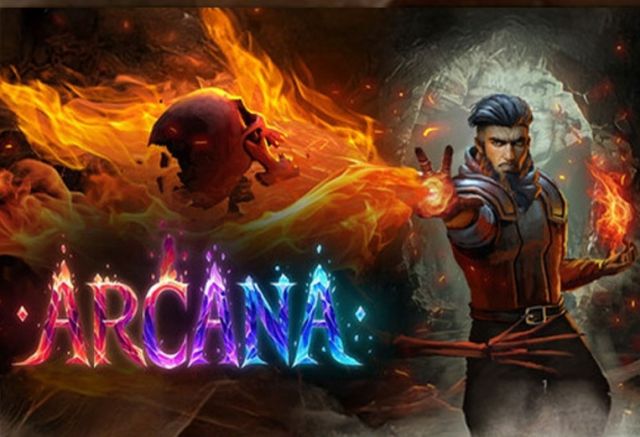COE News "ECE Students Create UCSB’s First Major Game"
A group of eight students from the UCSB Gaucho Game Lab create a polished role playing game (RPG) named Arcana

From the COE News article – "Journey to Arcana: A Student Team Creates UCSB’s First Major Game"
When a group of eight students enrolled in the UCSB Gaucho Game Lab, none of them could have known what they were embarking on, or that their plan to build a game would become a year-and-half long journey. What began as an expansive vision has now become Arcana, a polished Role Playing Game (RPG) born of iteration, collaboration, and lessons in project management.
In this fast-paced, third-person action RPG, players assume the role of a wizard who battles waves of enemies in arena-style combat. Drawing inspiration from popular RPGs such as Vampire Survivors, the game features a dynamic-progression system in which players level up, unlock new spells, and upgrade their powers to deal with increasingly difficult foes.
Like many projects, Arcana began with an idea. “We started with a big, exciting idea,” said Anthony Pella, the game’s lead designer, who completed his bachelor’s degree in computer engineering in 2023.
“The classroom process mirrors a studio process, being driven by critique, open dialogue, and creative collaboration,” said Pradeep Sen, professor in the Electrical & Computer Engineering Department and director of the Gaucho Game Lab. Students start by presenting their game ideas during a brainstorming-and-pitching phase, and then spend several weeks discussing, debating, and refining themes.
The game development class helps to prepare students for the ambiguity of real-world projects. “People don’t always know the right answer, so they talk it out, challenge each other’s thoughts, and iterate,” said Sen. “That’s what the students learned to do here.”
In the case of Arcana, the initial excitement of the project soon gave way to the reality of “scope creep,” referring to the project’s having expanded far beyond the original plan. “It was a really fun game on paper,” recalled Pella, “but in the first quarter, we realized that the scope wasn't manageable,” a fact compounded by the departure of three teammates at the end of the term.
The turning point came after the summer break, when, with Sen’s support, the students adopted a more structured, Agile-like workflow, implementing two-week sprints; daily stand-ups, in which student’s shared their progress, discussed any impediments, and planned for the next day's work; and clear task breakdowns. That shift from the initial democratic structure to a more top-down, though still collaborative process proved pivotal, resulting in a better and more cohesive game. The students also decided to scale back the game significantly, cutting unmanageable features in order to focus on creating a tight, engaging single-player experience. The results were immediate.
“Our productivity exploded, and the game really started to come together,” Pella said. In the first quarter, the team worked on just thirty pull requests (PRs), which are requests to merge changes into the main code, allowing the team to review and approve updates before they go live. That increased to two hundred PRs in the second quarter, followed by two hundred in the third, and one hundred after the course ended.
Even with the end in sight and about 3,500 hours of work in the project, the students weren’t finished, for they next had to overcome a tangle of legal obstacles, addressing questions of ownership, branding, and liability. With those challenges behind them, Red Athena Studios has released a demo of the game, which is expected to be published this summer and released on the Steam platform.
“Every quarter I worked on it, it was likely my busiest class,” Pella said of the experience . “But when you're making a game, you’re doing what you love, so it doesn’t feel like work in the same way as, say, writing a compiler does.”
Creating the game taught the students much more than complex programming skills. Pella said that he learned to translate abstract ideas into concrete systems, delegate tasks, mentor a team, and develop trust among the members by working collaboratively.
For students considering game development, he says, “Dive in. Start now, and don’t be afraid to learn as you go. And use AI the way you would use a code editor, not as a replacement for thinking.” He also noted, “I learned that finishing is very important, and that you win by creating, by delivering something, rather than by trying to make it perfect.”
COE News – "Journey to Arcana: A Student Team Creates UCSB’s First Major Game"